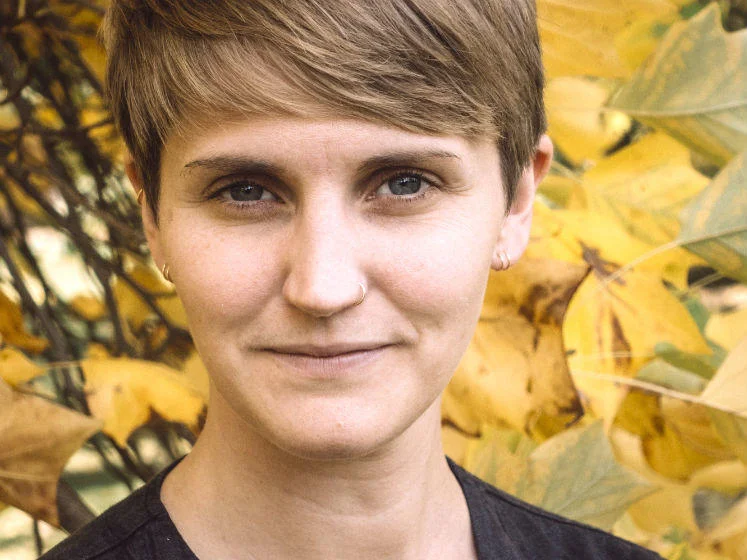Q&A with Jeanne Firth
Investigating celebrity chef aid work following Hurricane Katrina
Jeanne is a PhD candidate with the Department of Geography and Environment
When I was a child in the US, Pizza Hut ran a scheme called Bookit! where you got points for every book you read and could add them up to get free pizza. I haven’t read with so much fervour since I was a kid!
Jeanne Firth

What are you currently researching?
My project looks at food systems and the humanitarian aid work undertaken by celebrity chefs in the aftermath of Hurricane Katrina and the failure of the federal levee system in New Orleans.
After Katrina, local chefs were instrumental in rebuilding the city. Immediately after the flooding, many of them served up food to the community on street corners. They also worked to re-open their restaurants quickly after Katrina – helping to provide a sense of normality and giving people a familiar place to get together.
From those early stages, this work has been formalised and there are now many charitable foundations run by chefs. Chef foundations in New Orleans focus on youth development, health and, not surprisingly, food systems. A few are grant-making foundations, but many fundraise from the public and run their own programming, such as culinary training for teens.
Restaurants and chefs are uniquely placed to symbolise how the city is rebuilding —successful restaurants have been upheld as a sign that New Orleans is recovering.
For my research, I did 15 months of fieldwork in New Orleans, where I spoke to a wide range of stakeholders - including chefs, charitable foundations, community organisations and beneficiaries - to try and understand the continued growth of chef philanthropy in the city (and internationally).
What attracted you to this area of research?
I was inspired by the increasing amount of private funding in humanitarian aid on a global scale.
In 2009, I did a master’s in Gender, Development and Globalisation at LSE’s Department of Gender Studies which instilled an interest in how food aid is financed and the power dynamics involved.
During the course, I did a class with Professor Sylvia Chant - she was incredible and I couldn’t resist an opportunity to become her PhD student!
Before doing your PhD, you worked for ‘Grow Dat Youth Farm’ in New Orleans, can you tell us more about their work?
Grow Dat Youth Farmis a community organisation with a focus on youth leadership. The produce from the farm is sold at farm stands, and 30% is ‘Shared Harvest’, free produce which is shared with other groups committed to building collective power in New Orleans.
I am on the founding staff team and started with Grow Dat straight after finishing my master’s degree.
Being involved with an organisation like Grow Dat Youth Farm and having the experience of working on the ground as New Orleans was rebuilding has helped immensely with my PhD. I learned that questions about rebuilding are largely questions about the future but, in answering them, we must defer to history.
Was has been your biggest highlight during your PhD?
Collaboration. I truly enjoy pouring over 100 books at a time, but what I love is the social dynamics of field work and academic scholarship. I really enjoy working with and creating knowledge with other people, including doing panel events and writing papers with both scholars and practitioners.
What has been the biggest challenge?
I think one of the hardest things during your PhD is trusting that all the tiny bits and pieces of data and knowledge that you collect over the years will come together to make a whole.
You’re constantly toggling between the micro and the macro when producing scholarship, which can be very challenging. I think all researchers will talk about the dual pleasure and fear of going down a rabbit hole and going really deep into a certain way of thinking.
How do you de-stress?
Perhaps surprisingly, I have fallen desperately in love with reading again, especially fiction.
When I was a child in the US, Pizza Hut ran a scheme called Bookit!where you got points for every book you read and could add them up to get free pizza.
I haven’t read fiction with so much fervour since I was a kid getting pizza! I would have thought reading so much for my PhD would have exhausted me but, instead, it has ignited my passion for reading.
I especially enjoy feminist science fiction and nature writing. Authors I’d really recommend include Ursula K. LeGuin, N. K. Jemisin, Robin Wall Kimmerer, Octavia Butler, Terry Tempest Williams.
I’ve also just finished Richard Powers' The Overstory - which is stellar.
What has been the best piece of advice you’ve received about doing your PhD?
Dr Laura Murphy, who’s a mentor and a friend at Tulane University, encouraged me to focus on methodology and to train in method as part of my PhD. It was fantastic advice.
She thought I would be very excited about the content of my research but wanted to remind me that often, how we do research matters just as much as what we find.
You won a Class Teacher of the Year award this year. What tips do you have for engaging with students and building rapport?
I really think anyone who’s teaching should spend time in youth-led spaces. It’s a fabulous way to be exposed to popular education. This is a teaching method which starts with the knowledge already in the room and how everyone’s individual experiences are related to larger issues in society.
As a teacher you start from this point, then add new information and theory. It’s a much more collective way of learning and very much bottom up rather than top down.